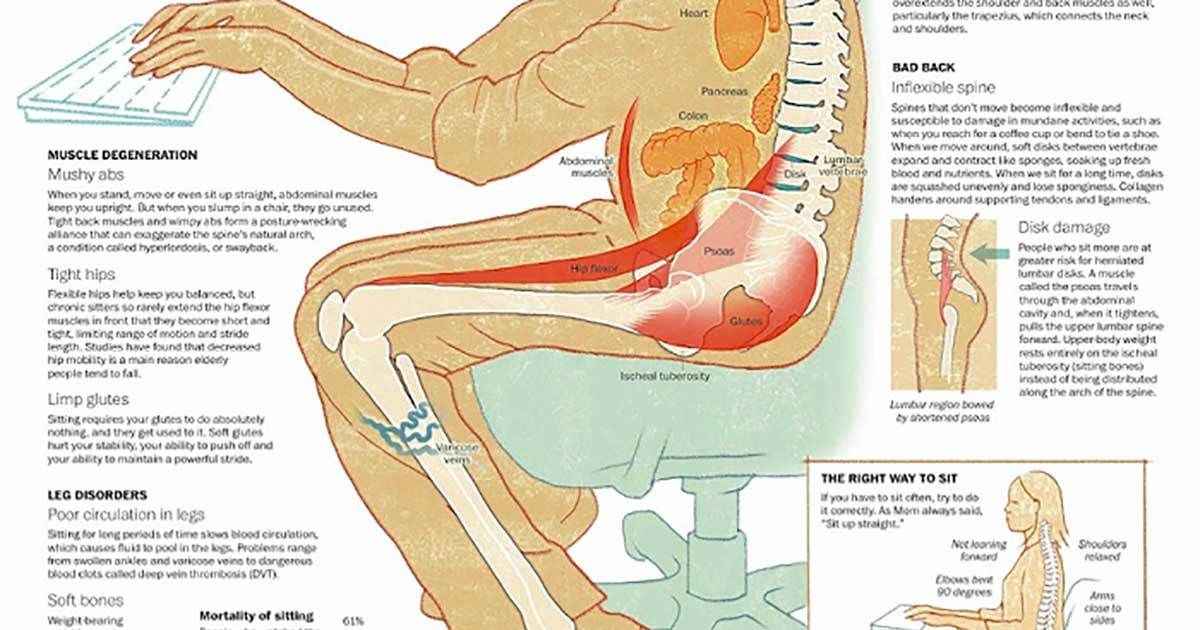Nowadays, we live in a world where we don't have to do much manual labor thanks to the many different modern machines. In fact, more than 34 million people in America have sales or office jobs, which means they have to remain sedentary for at least 8 hours a day.
The Annals of Internal Medicine published a report which explains that an average person spends half of their waking hours sitting at a computer, commuting to and from work, watching TV, etc. In other words, we spend most of our day in an inactive state.
Even though modern technology helps us save time and effort for many activities, not to mention the ability to connect us to others in an instant, it also has many disadvantages.
Sitting down for too long can cause many health problems, including poor posture, chronic back pain, and even contribute to obesity, heart disease, and diabetes.
Four experts explain how prolonged sitting can affect your health. So, if you're one of those who work a desk job, take a moment to read the following.
Shoulder, Neck, and Brain Issues
By moving your body, you allow more oxygen and blood flow throughout your brain. This, in turn, enables you to maintain mental clarity and sharp mind. But, if you sit for too long, the oxygen-rich blood flow to the brain will slow down, affecting your ability to think clearly.
What's more, staring at the computer and slumping forward every day puts enormous stress on the vertebrae on your neck, or the part which connects the spine to the head.
In addition, poor posture from leaning over the keyboard is bad for your shoulder and back muscles, overextending and damaging them over the long run.
Back Issues
The most common problem associated with prolonged sitting is back problems. That's because poor posture contributes to inflexible spine, back pain, and disc damage.
On the other hand, moving around enables expanding and contracting of the soft discs between vertebrae, allowing nutrient-rich blood in. Prolonged sitting makes the disc compact and uneven, sometimes even leading to collagen buildup around ligaments and tendons.
According to experts, people who spend a lot of time staring at computer screens are more prone to herniated lumbar discs.
Muscle Degeneration
When you sit, you don't use your ab muscles at all. So, if you don't use them for too long, you might develop swayback "“ an overextension of the natural curve of the spine. What's more, prolonged sitting reduces your back and hip flexibility.
Since flexible hips help your body to stay stable, sitting for a long time on a regular basis could make the hip flexor muscles tense and short.
Other muscles affected by prolonged sitting are the glutes. They become soft over the long run, hindering your ability to keep your body stable and take long strides.
Deterioration of Organs
Being inactive for long hours causes insulin overproduction and sluggish blood flow to your organs. That's why sedentary lifestyle contributes to weight gain, diabetes, cardiovascular disease, and heart disease.
On the other hand, being active boosts your body's antioxidant capacity to kill free radicals, thus protecting it against premature signs of aging and diseases such as cancer.
Leg Problems
Sitting for long hours obstructs the blood flow in your legs. As a result, you might experience varicose veins, swollen ankles, and even dangerous blood clots. Also, your bones can become less dense and weaker.
On the opposite, regular physical activity, like walking or running, keeps the bones thick and strong. That's why sedentary lifestyle increases the risk of osteoporosis.
How to Beat This Growing Epidemic of Sedentary Lifestyle

If you must sit for many hours, like those working a desk job, try to avoid leaning over the keyboard or slouching in your chair. In other words, try to sit up straight.
If you can sit on an exercise ball, that's even better. The ball will keep your ab muscles active and your body straight. In case you want a more stable option, choose a backless stool.
Another thing to keep in mind is to get up and do some stretch every thirty minutes. Don't forget to walk around for a couple of minutes as well. This will keep your oxygen-rich blood flowing in your body, allowing your muscles and brain to function properly.
Last but not least, do yoga or get a standing work desk to avoid sitting for too many hours. This will keep you upright and allow an optimal blood flow throughout the body, thus preventing blood clots and many other complications.
The post Four Scientists Explain What Sitting Too Long Does To Your Body appeared first on Gotta Do The Right Thing.

